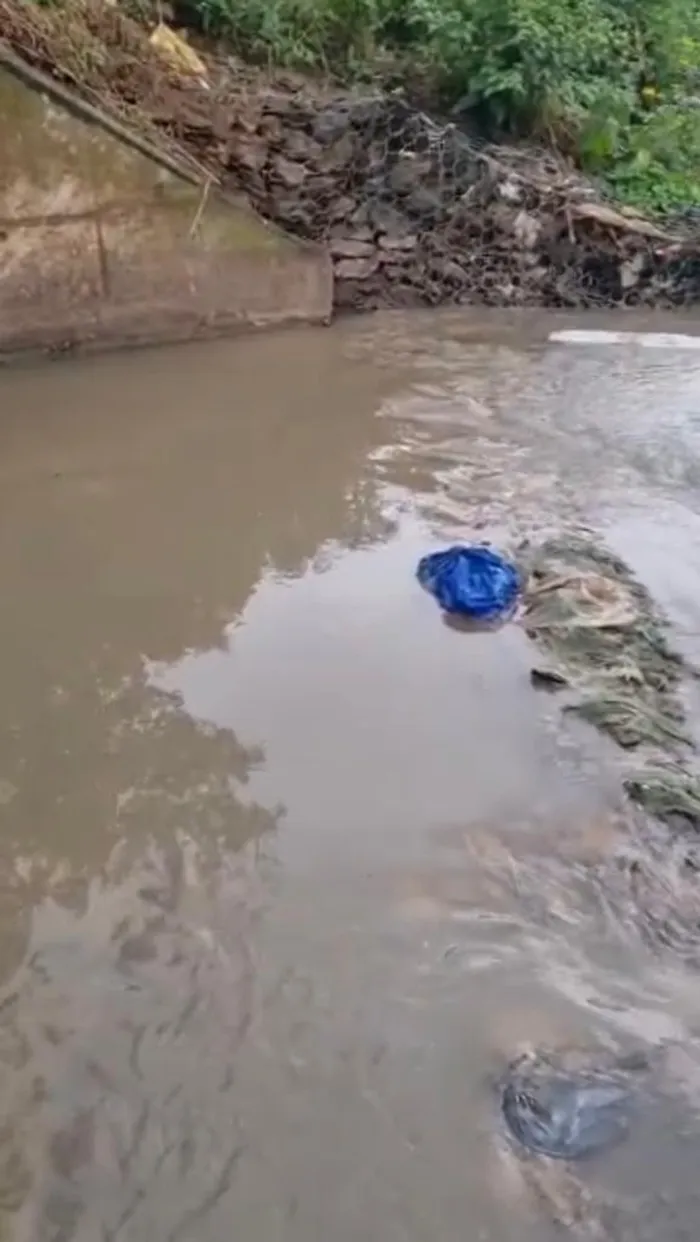‘This is a humanitarian crisis’

A screenshot from a video released at the weekend which raised the alarm over sewage flowing into the Umgeni River.
ETHEKWINI Municipality has warned residents against coming into contact with water in local estuaries and lagoons due to E. Coli contamination.
A video circulating on social media at the weekend showed sewage flowing into the Umgeni River. This got residents worried again.
Msawakhe Mayisela, eThekwini spokesperson, said: “Residents are advised to stay clear of these water bodies until such time that the City announces that they are clean.”
He said the sewage flow seen in the footage was as a result of the station being vandalised.
“The City’s teams have managed to repair the panels in the meantime. However, we are still awaiting budget approval before we can install the removed panels. Fixing vandalised infrastructure costs the City millions of rand.
“Hence, we are calling on the public to work with the City, and the government in general, to arrest the scourge of destroying government infrastructure in our communities.”
Mayisela said environmental experts had advised the City to keep estuary water near lagoons closed.
He said: “We hope that by November, all Durban beaches will be ready.”
Peter Graham, the CEO of Singakwazi Aid, a water purification organisation, was the creator of the video circulating on social media.
He said the problem was more swimming and surfing related, than fishing.
“The bottom line is that fish like eating the biomass associated with E. Coli. It is food for them and they don’t get sick.
“If you catch a fish and cook it by heating it for 5 minutes at 60°C, and for any length of time at 70°C or 100°C, all E. Coli bacteria will be killed.
“Most freshwater systems have a level of E. Coli in them but as long as the fish is cooked properly, there is no problem. However, this only applies to live, healthy fish.”
Graham said increased E. Coli levels often have an inverse relationship with dissolved oxygen levels.
“These fish could become unhealthy due to other causes which could then render them unhealthy. The fish that died in the Umgeni River recently didn’t die from E. Coli levels.
“They died either from a highly toxic substance that was illegally dumped into the river or they suffocated due to low oxygen levels. Micro plastics are the main problem in fish as they are a cumulative poison.”
GreenPeace recently started a petition calling for more action to be taken to clean up the rivers and beaches.
Desiree Laverne, a water and sanitation expert from GreenPeace, said poor water quality in rivers and beaches was not a new problem. She described the situation as a humanitarian crisis.
“The government uses the April floods as a reason to explain why there are high levels of E. Coli in the water, but this problem existed way before the floods.
“In 2020, Premier Nomusa Dube-Ncube was the MEC for Economic Development, Tourism and Environmental Affairs.
“After a severe oil spill from the highly polluted Umbilo River that year in October, she made a promise that her department and the mayor were dealing with the issue.
“We are hoping to submit this petition to her next month because it is obvious to see that the job they have been mandated to do is not being done.”
Laverne said access to clean water was a vital human right.
“I have to wonder which human right they will take away from us next. At this point, it would be better to drink water from your toilet than the water coming from your tap.
“There are people who cannot afford bottled water from Drakensberg and rely on the water from the rivers to wash their vegetables and even make a living, like coastline fishermen who need to fish for sustenance.”
John Peter Narayanasamy, chairperson of the KZN Subsistence Fishing Forum, said his forum had 30 000 fishermen who rely on sustenance from fishing.
“These are poor and vulnerable fishermen who live below the poverty line. They either need to sell the fish for income or cook the fish to feed their families.”
He said the municipality contradicted what independent water and sanitation institutions were saying.
“The water is unacceptable for any water activity, yet the municipality says otherwise. They gave false water results during the Comrades Marathon just so they could attract tourists.
“We are approaching the festive season and I do not think the beaches will be safe even then.”
He said more needed to be done.
“With the little we have, we try to provide food hampers to our fishermen but we should be getting compensated by the Department of Forestry, Fisheries and the Environment.
“We pay a fishing licence to them every year but get nothing in return. I speak to a number of fishermen who live close to the coastline who say they would rather take the risk of eating the fish than letting their families die of hunger. People are suffering.”
He said poor water quality also impacted the ecosystem.
“The coral reefs, which are critical to the balance within the aquatic food chain, are presently dormant. So a large number of fish have migrated into the deep, which is disruptive to the food chain.”
POST
Related Topics: